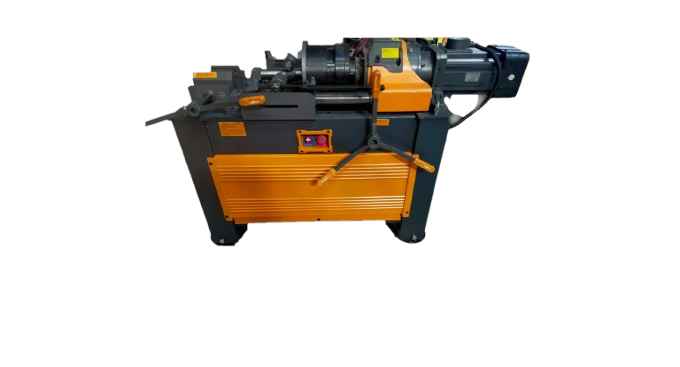Description
A Bar Threading Machine is a specialized tool used in construction and manufacturing industries for threading steel bars.
Purpose: The primary function of a Bar Threading Machine is to create threads on the ends of steel bars, rods, or pipes. These threaded bars are essential in construction for joining structural elements using nuts and bolts or for securing materials in concrete.
Safety Features: Like other industrial machines, Bar Threading Machines include safety features such as emergency stops, guards around moving parts, and safety interlocks to protect operators from hazards.
Maintenance: Regular maintenance is crucial to keep the machine in optimal condition, including lubrication of moving parts, inspection of cutting tools, and calibration of controls.
Types of Threading: Bar Threading Machines can perform various types of threading operations, including:
- Straight Threading: Standard threads that run parallel to the axis of the bar.
- Taper Threading: Threads that taper along the length of the bar.
- End Threading: Creating threads only on one end of the bar.
- Pipe Threading: Specialized dies for threading pipes .
A threading machine is an essential industrial tool designed to create precise threads on various materials such as pipes, rods, bolts, and rebars. These machines are integral in sectors like construction, plumbing, and manufacturing, where accurate threading ensures the integrity and compatibility of mechanical connections.
🛠️ Types of Threading Machines
-
Pipe Threading Machines: Engineered to cut external threads on pipes, these machines are vital for plumbing and gas line installations.
-
Bolt Threading Machines: Specialized for threading bolts, they are commonly used in manufacturing and assembly lines.
-
Rod Threading Machines: Designed to thread rods, often utilized in construction for creating threaded rods used in structural applications.
-
Rebar Threading Machines: Specifically made to thread reinforcement bars (rebars), facilitating the connection of rebars in reinforced concrete structures.
⚙️ Technical Specifications
While specifications can vary based on the machine type and model, common parameters include:
-
Threading Capacity: Ranges from 6mm to 100mm, accommodating various diameters depending on the machine.
-
Spindle Speed: Variable speeds, typically between 25 to 180 RPM, allowing for flexibility based on material and thread requirements.
-
Motor Power: Machines are equipped with motors ranging from 3 HP to 20 HP, ensuring sufficient power for threading operations.
-
Production Rate: Depending on the machine and material, production rates can vary from 15 to 120 pieces per hour.
-
Machine Weight: Varies significantly, from approximately 500 kg for smaller models to over 2500 kg for larger, industrial-grade machines.
-
Power Supply: Typically designed for three-phase power, with voltage requirements ranging from 380V to 440V.
✅ Key Features and Benefits
-
Precision and Consistency: Ensures uniform thread quality, crucial for mechanical integrity.
-
Versatility: Capable of threading various materials and accommodating different thread standards.
-
Durability: Constructed with robust materials to withstand heavy-duty operations and extend service life.
-
Efficiency: High production rates reduce operational time and increase productivity.
-
Safety Features: Incorporates safety mechanisms to protect operators during use.
🏗️ Applications
-
Construction Industry: Threading rebars and rods for reinforced concrete structures.
-
Plumbing and Gas Fitting: Creating threaded connections for pipes in residential and commercial installations.
-
Manufacturing: Producing threaded components like bolts and rods for machinery and equipment.
-
Automotive and Aerospace: Fabricating precision-threaded parts critical for performance and safety.


 Brochure
Brochure Call Us
Call Us Whatsapp Now
Whatsapp Now